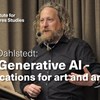programmes
Previous research programs
Here you can find information on the Institutes previous research programs during the 2000s. Contact us for more information about previous research programs. Gustaf Arrheniusfirst research program was n and comprised five themes that were all interdisciplinary; Our responsibility towards future generations, Democracy in the 21st century, New technologies and the future of humanity, Discrimination, sexism and racism, and Equality.
Three Routes to a Pension Reform. Politics and Institutions in Reforming Pensions in Denmark, Finland and Sweden
By analysing pension reforms in three Nordic countries – Denmark, Finland and Sweden that apply different institutional solutions in their old-age security programmes – the paper argues that the polit
The refinement paradox and cumulative cultural evolution: Complex products of collective improvement favor conformist outcomes, blind copying, and hyper-credulity
PLOS Computational Biology Abstract Social learning is common in nature, yet cumulative culture (where knowledge and technology increase in complexity and diversity over time) appears restricted to huma
Existential risk to humanity
Existential risks are those risks that threaten the entire future of humanity - not just the present generation, but all future generations. Despite their importance, issues surrounding human extincti
Palle Dahlstedt: Big generative AI - Implications for creativity, art, and artists
Date & Time: Wednesday, June 12 at 10:00-11:45 (CET)Venue: Institutet för framtidsstudier, Holländargatan 13, 4th floor, Stockholm, or online. Research seminar with Palle Dahlstedt, Professor in In

Big generative AI - Implications for creativity, art, and artists
Research seminar with Palle Dahlstedt, Professor in Interaction Design at Gothenburg University. In this lecture, Palle Dahlstedt will share a pragmatic, critical, and visionary view of what machine l
Study Shows Why People Dislike Carbon Taxes
A carbon tax would be effective and inexpensive – so why do people dislike the idea? A new study provides answers. Economists agree that a carbon tax is one of the most cost-effective ways to reduce gr No, not at all, according to a new study.

Commission: The global politics of AI and healthcare
This is a commission to write a discussion piece for policy makers on how to navigate the changing global politics of AI and healthcare. It is part of the Global (Dis)order Policy Program lead by the British Academy and Carnegie Endowment for International Peace.
Artificial superintelligence and its limits: why AlphaZero cannot become a general agent
AI & Society (2020) Abstract An intelligent machine surpassing human intelligence across a wide set of skills has been proposed as a possible existential catastrophe (i.e., an event comparable in val
Artificial superintelligence and its limits: why AlphaZero cannot become a general agent
in: AI & SOCIETY AbstractAn intelligent machine surpassing human intelligence across a wide set of skills has been proposed as a possible existential catastrophe (i.e., an event comparable in valueproductivedesires, or desires that can direct behavior across multiple contexts. However, productive desires cannotsui generisbe derived from non-productive desires. Thus, even though general agency in AI could in principle be created by human agents, general agency cannot be spontaneously produced by a non-general AI agent through an endogenous process (i.e. self-improvement). In conclusion, we argue that a common AI scenario, where general agency suddenly emerges in a non-general agent AI, such as DeepMind’s superintelligent board game AI AlphaZero, is not plausible.








